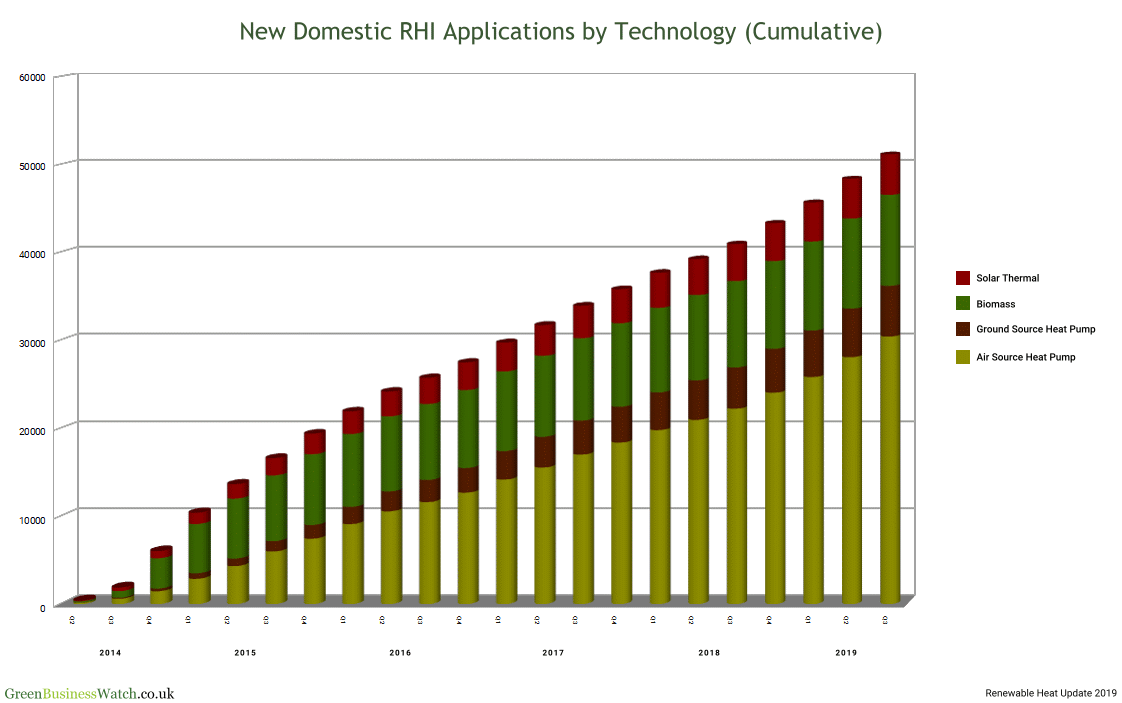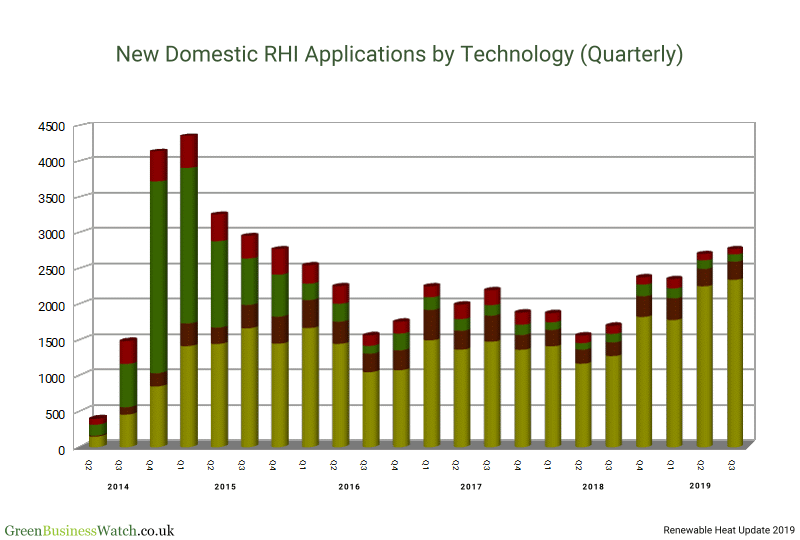The latest data available for the Domestic Renewable Heat Incentive covers the period from the launch of the scheme on April 9th, 2014 to the end of September, 2019.
The Domestic Renewable Heat Incentive (Domestic RHI) is a UK Government scheme to encourage the use of renewable heating technologies. Under the scheme householders receive quarterly payments for a period of 7 years, based on the amount of renewable heat their system produces.
As the main funding vehicle for renewable heating technologies, the domestic RHI gives us a good indication of installation numbers and the state of the market for renewable heating technologies. In the Domestic Renewable Heat Update we look at the quarterly status of heat pumps, biomass and solar thermal installations in the UK.
Air source heat pumps account for 60% of new installations since the start of the domestic RHI. Biomass, was the most popular technology over the first year of the scheme but accounts for just 20% of new installations overall. In recent quarters, ground source heat pumps has consistently been the second strongest technology, albeit a distant second when compared with air source installation numbers.
Key Points From September 2019
A Strong Quarter and a Strong Year for Renewable Heat Installations
The third quarter of 2019 was a strong one for the domestic RHI, with 2,772 new applications. That’s more installations than in any quarter since 2015. This, after 3 previous strong quarters, is a good sign for the health of the market. The year from October 2018 to September 2019 saw 10,218 new domestic RHI applications, a 48% increase over the previous 12 month period. Air source heat pumps dominate these new installations, with figures for the other technologies a bit more of a mixed bag.
Air Source Heat Pumps See Record Growth, Again
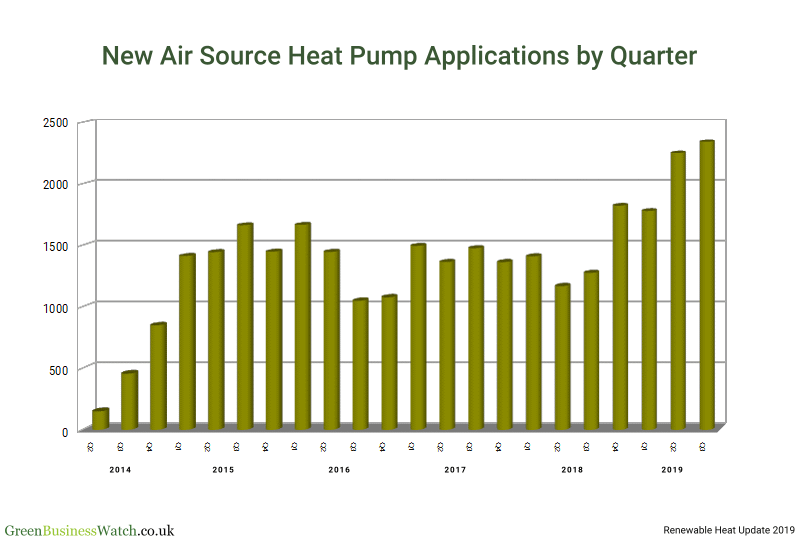 Quarterly air source heat pump installations grew to 2,341 in the 3rd quarter of 2019. Q2 had been a record quarter with 2,250 new installations and the past year has also seen record numbers for domestic air source installations. Air source heat pumps have come to dominate installation numbers over the course of the domestic RHI. While they have yet to match the peaks achieved early on with biomass, the picture painted of the growth of air source looks, perhaps, more sustainable.
Quarterly air source heat pump installations grew to 2,341 in the 3rd quarter of 2019. Q2 had been a record quarter with 2,250 new installations and the past year has also seen record numbers for domestic air source installations. Air source heat pumps have come to dominate installation numbers over the course of the domestic RHI. While they have yet to match the peaks achieved early on with biomass, the picture painted of the growth of air source looks, perhaps, more sustainable.
Ground Source Installations are Steady
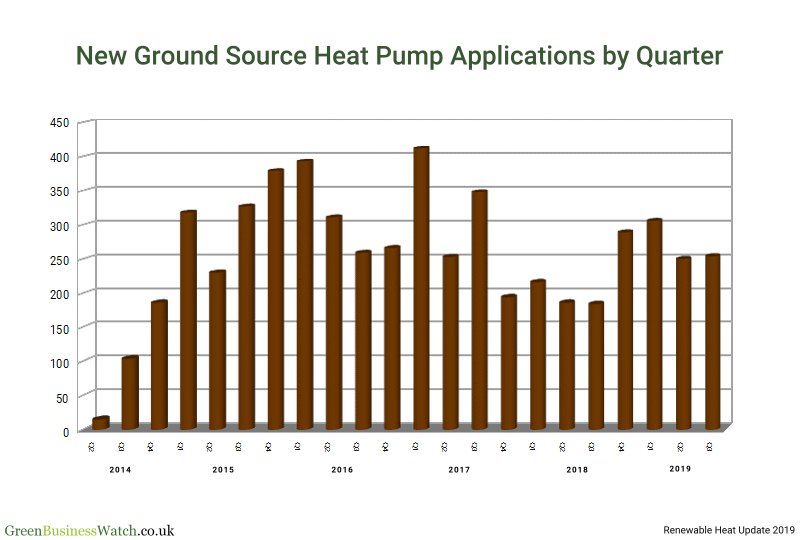 Ground source heat pump numbers have never competed with the huge peaks biomass achieved early in the scheme, or the increased adoption rate of air source heat pumps. On the other hand, ground source hasn’t suffered the troughs that both biomass and solar thermal have. Adoption of ground source since the launch of the domestic RHI might best be described as slow and steady. While ground source installation numbers are not at their peak over the last few quarters, they are up year on year. Overall, the experience since the start of the scheme seems to be one of stability. Ground source heat pumps have consistently been the second largest technology under the domestic RHI for several years now. With 254 installs on the quarter, ground source heat pump numbers are dwarfed by air source which had 2,341 new installations in the same period.
Ground source heat pump numbers have never competed with the huge peaks biomass achieved early in the scheme, or the increased adoption rate of air source heat pumps. On the other hand, ground source hasn’t suffered the troughs that both biomass and solar thermal have. Adoption of ground source since the launch of the domestic RHI might best be described as slow and steady. While ground source installation numbers are not at their peak over the last few quarters, they are up year on year. Overall, the experience since the start of the scheme seems to be one of stability. Ground source heat pumps have consistently been the second largest technology under the domestic RHI for several years now. With 254 installs on the quarter, ground source heat pump numbers are dwarfed by air source which had 2,341 new installations in the same period.
Biomass Yet to Recover
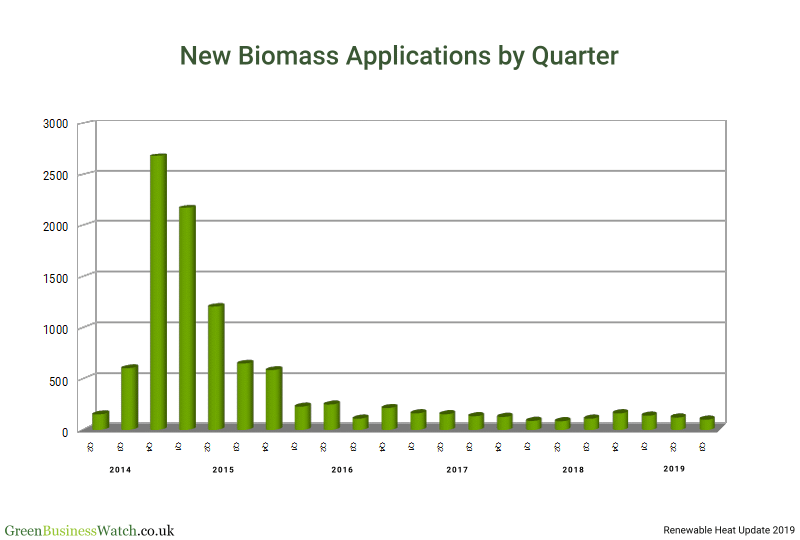 Between the launch of the Domestic RHI in early 2014 and the end of 2015 the tariff rates paid for biomass had roughly halved. Just glancing at the installation figures and the overwhelming popularity of biomass in the early days of the scheme might support the notion that biomass was over funded. It is equally clear from the figures that biomass installations have never recovered from the cuts. From the start of 2016 until now, biomass installation numbers under the domestic RHI have been behind ground source heat pumps in every single quarter.
Between the launch of the Domestic RHI in early 2014 and the end of 2015 the tariff rates paid for biomass had roughly halved. Just glancing at the installation figures and the overwhelming popularity of biomass in the early days of the scheme might support the notion that biomass was over funded. It is equally clear from the figures that biomass installations have never recovered from the cuts. From the start of 2016 until now, biomass installation numbers under the domestic RHI have been behind ground source heat pumps in every single quarter.
Solar Thermal Installation Numbers Remain Low
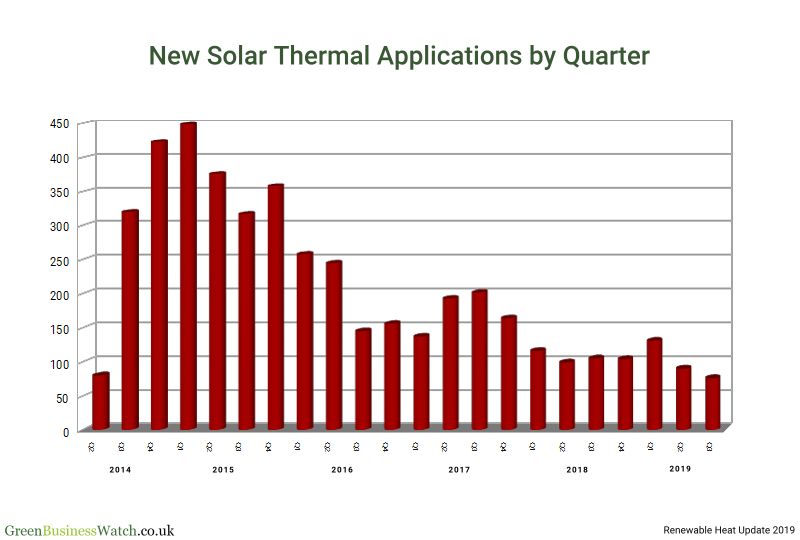 Solar thermal has never been popular under the domestic RHI and the latest quarter shows just 76 new applications. That is the worst single quarter since the launch of the scheme.
Solar thermal has never been popular under the domestic RHI and the latest quarter shows just 76 new applications. That is the worst single quarter since the launch of the scheme.
New Applications by Installed Technology
New applications are for systems installed since the launch of the scheme on 9th April 2014.
| Technology | Applications | Accreditations | ||
|---|---|---|---|---|
| Number | % | Number | % | |
| Air Source Heat Pump | 29,278 | 60% | 28,762 | 60% |
| Ground Source Heat Pump | 5,517 | 11% | 5,439 | 11% |
| Biomass | 9,639 | 20% | 9,569 | 20% |
| Solar Thermal | 4,050 | 8% | 9569 | 8% |
| Total | 48,484 | 100% | 47,803 | 100% |
Total Applications by Installed Technology
Total applications include both new applications and legacy applications.
| Technology | Applications | Accreditations | ||
|---|---|---|---|---|
| Number | % | Number | % | |
| Air Source Heat Pump | 41,522 | 56% | 40,995 | 56% |
| Ground Source Heat Pump | 10,503 | 14% | 10,419 | 14% |
| Biomass | 12,813 | 17% | 12,735 | 17% |
| Solar Thermal | 9,024 | 12% | 9,005 | 12% |
| Total | 73,862 | 100% | 73,154 | 100% |



